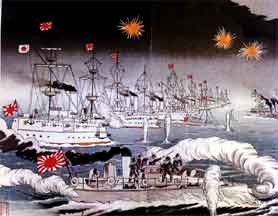1905 Japanese Destroy Russian Fleet Win the War
In the Battle of the Straits of Tsushima, the Japanese, led by Admiral Tojo, decisively defeated Admiral Rozhdestvenski's Russian Baltic fleet, sinking almost all of it. This significant victory led to the Russians conceding to most Japanese demands during negotiations in Portsmouth, facilitated by U.S. President Theodore Roosevelt. The terms included Japanese domination of the Korean peninsula, withdrawal of both Russian and Japanese troops from Manchuria, cession of Port Arthur and Dalny rights to Japan, and the transfer of the southern Sakhalin Islands to Japan.
The Russo-Japanese War, which spanned from 1904 to 1905, was primarily fought over control of Manchuria and the Korean Peninsula. Japan and Russia both sought to expand their influence in these regions, leading to a tense rivalry. As the conflict escalated, both nations engaged in a series of military confrontations, culminating in the Battle of Tsushima.
The Battle of Tsushima
In May 1905, the Russian Baltic fleet, led by Admiral Zinovy Rozhdestvenski, embarked on a six-month journey to the Pacific to confront the Japanese navy. The fleet was tasked with breaking the Japanese blockade of Port Arthur, a strategic location in northeastern China that Russia had previously seized from Japan.
Upon reaching the Straits of Tsushima, the Russian fleet encountered the Japanese navy, commanded by Admiral Heihachiro Togo. The ensuing battle was a devastating defeat for the Russians, with the Japanese sinking almost the entire Russian fleet.
Several factors contributed to the decisive Japanese victory at Tsushima. Firstly, the Russian fleet had been at sea for six months, during which the sailors and ships had endured considerable hardship. As a result, the Russian vessels were in poor condition, and the crews were exhausted and demoralized by the time they reached the battleground.
Secondly, the Japanese navy was better prepared and more technologically advanced than its Russian counterpart. Japanese ships were faster, more maneuverable, and armed with superior weaponry. Additionally, Admiral Togo was a skilled tactician who effectively utilized these advantages to outmaneuver and outgun the Russian fleet.
The magnitude of the Japanese victory at Tsushima had a profound impact on the outcome of the Russo-Japanese War and the subsequent peace negotiations. The loss of the Baltic fleet weakened Russia's strategic position, forcing the Russian government to agree to nearly all of the Japanese demands at the negotiating table.
An agreement, known as the Treaty of Portsmouth, was reached under the auspices of U.S. President Theodore Roosevelt. The treaty stipulated that Russia would recognize Japanese domination of the Korean Peninsula and withdraw its troops from Manchuria. In return, Japan would also withdraw its forces from the region. Furthermore, Russia ceded its rights to Port Arthur and Dalny to Japan and relinquished control of the southern part of Sakhalin Island.
Impact on Russo-Japanese Relations and the Balance of Power in East Asia
The Battle of Tsushima and the subsequent Treaty of Portsmouth significantly altered the balance of power in East Asia. Japan's decisive victory demonstrated its growing military capabilities and solidified its status as a major power in the region. This development challenged the traditional dominance of European powers in Asia and marked the beginning of Japan's emergence as a global player.
Meanwhile, Russia's defeat in the battle and the war as a whole exposed its military and political weaknesses, leading to domestic unrest and contributing to the Russian Revolution of 1905. The outcome of the Russo-Japanese War also signaled a shift in global alliances, as countries reassessed their relationships with both Russia and Japan in light of
 >
>